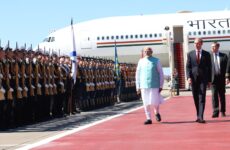Vancouver, British Columbia’s striking teachers are turning up the pressure in their ongoing labour dispute by overwhelmingly endorsing a third-party resolution process that’s been repeatedly rejected by the provincial government.
Jim Iker, president of the B.C. Teachers’ Federation, announced Wednesday night that 99.4 per cent of the 30,669 teachers who cast ballots Wednesday voted to end the strike through binding arbitration.
The provincial government has twice rejected the process as a way to end the strike, saying a negotiated settlement is the best method even after a mediator declared the two sides remain far apart.
“Unfortunately tonight, there is a single group of people standing in the way of schools opening their doors tomorrow,” said Iker. “The BC Liberal government’s refusal to accept binding arbitration is now the only reason children won’t be back in class.”
Iker said the government is “alone” in its stance, adding that teachers, students, parents, mayors, school boards, legal experts, union leaders and editorial boards have called for binding arbitration.
Within 30 minutes of Iker’s announcement, Education Minister Peter Fassbender released a statement of his own, calling the results “widely expected and understandable.”
“As we have consistently made clear, binding arbitration would lead to unacceptable tax increases in this case,” said Fassbender. “That’s because the two sides remain too far apart on wages and benefits.
“The best way to resolve this labour dispute remains at the negotiating table.”
Earlier in the day, nine unions banded together and announced $8 million in interest-free loans for financially struggling members of the teachers’ union.
“It’s not going to be money that’s going to end this dispute. No one will be starved out here,” said B.C. Federation of Labour president Jim Sinclair, flanked by eight labour leaders who vowed support for teachers outside a Vancouver high school.
“It’s going to be (Premier) Christy Clark who must end this dispute by going to arbitration and solving the problems,” Sinclair said.
Along with the loans, the B.C. Nurses’ Union, which will soon be negotiating its own contract ending in March, donated $500,000 to the teachers’ union to ensure the government does not “bleed them dry,” said president Gayle Duteil.
Soon after the unions announced their support for teachers, dozens of picketing teachers protested in Maple Ridge, where their loud chanting penetrated Clark’s remarks at a municipal event.
Clark continued to reject the potential of binding arbitration as a solution that could allow half a million students to start school.
“I really do believe we can still get an agreement,” Clark said in an interview. “And I know that emotions are running very high but I also know that sometimes when emotions are running high, it’s sometimes when, strangely, these opportunities present themselves.”
The government has said the results of binding arbitration could be expensive for taxpayers. A settlement awarded to B.C. doctors by an arbitrator more than a decade ago prompted a tax hike.
The province maintains the B.C. Teachers’ Federation is asking for double the wages of 150,000 public-sector workers who have already settled contracts, but a coalition of unions has demanded the government stop using them as scapegoats.
“Using us as an excuse not to settle with the teachers doesn’t really sit well with us,” said Stephanie Smith, president of the B.C. Government and Service Employees’ Union, representing more than 60,000 workers.
“Whatever is given to one set is not automatically bargained with the next,” Smith said, adding the BCGEU has sectoral agreements with a provision tied to the health sciences and nurses’ unions, but not to the teachers’ union.
On Tuesday, the union representing BC Hydro workers announced it was asking members to put forward $100,000 collateral for a loan for struggling teachers.
The amassing funds will be distributed to teachers through a general hardship fund managed by their union but not be used as strike pay, said BCTF vice-president Glen Hansman.
Teacher Nigel Reedman, who voted in favour of the binding arbitration proposal, said that option was not a “home run” for either side but that his union’s attempt to end the dispute was a “good middle ground.”
“We’re ready to go back, we want to be back and we hope the government agrees with it,” he said. “Honestly, I’m dying to get back. I love my job, and I want to get back, see my students, get back into my classroom and start teaching again. I hope it’s soon.”




 Driving Naari Programme launched in Chandigarh
Driving Naari Programme launched in Chandigarh






























